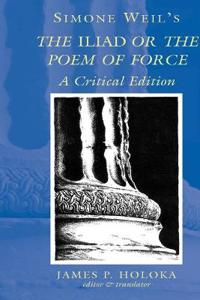Where to start with this one.
It’s barely a book, really just an essay. And I’m not smart enough to have any kind of insightful commentary on Simone Weil but fuck it, we ball.
I’d been meaning to read Weil for some time, so when my philosophy study group voted on “The Iliad, or the Poem of Force” as our November selection, I saw my chance and I took it. Is it her most beginner-friendly work? Who’s to say.
Weil is clearly enamored with The Iliad and heaps no end of praise on it, but she’s also using it to frame a political philosophy thesis: the true driver of history is force, defined as “that x that turns anybody who is subjected to it into a thing. Exercised to the limit, it turns man into a thing in the most literal sense: it makes a corpse out of him.” That is the force she refers to in the title of the essay, and her accolades for The Iliad are based in part on her opinion that it is the best, most accomplished depiction of force in Western literature.
Why Weil names this “force” (“la force” in the original French) and not “violence” is a question I wish I had asked the study group because I find myself at a loss for an answer. Maybe because violence is too restrictive a concept to categorize Nazi Germany—it’s hard not to read Weil, a French woman of Jewish background* writing in 1939, and not think about Nazis. But this thing called force is also her response to Marxist and Hegelian dialectics in addition to Nazis, and it also includes violence (or force) deferred: “…the force that does not kill, i.e., that does not kill just yet. It will surely kill, it will possibly kill, or perhaps it merely hangs, poised and ready, over the head of the creature it can kill, at many moment, which is to say at every moment. In whatever aspect, its effect is the same: it turns a man into a stone.”
Pretty irrefutable argument. And through her reading of The Iliad, where for Weil its greatness stems from showing how every character on every side is subjected to force, how people find it in themselves to love in the face of force, and how force destroys and renders tragic the things we most value in life, we can understand that Weil is critical of force and believes that we can’t escape history except by somehow transcending force.
None of that has really stopped being relevant, has it?
*Weil’s conversion to Christianity shouldn’t be overlooked, especially considering its influential role in her philosophy, but that particular factor of her birth is important for establishing the precise nature of her relationship to the Nazis and vice versa.

